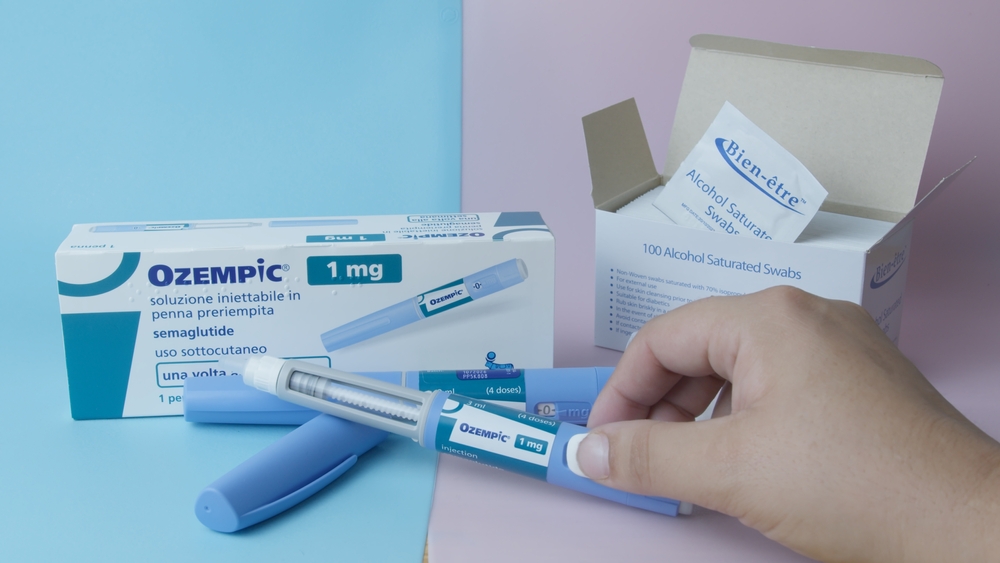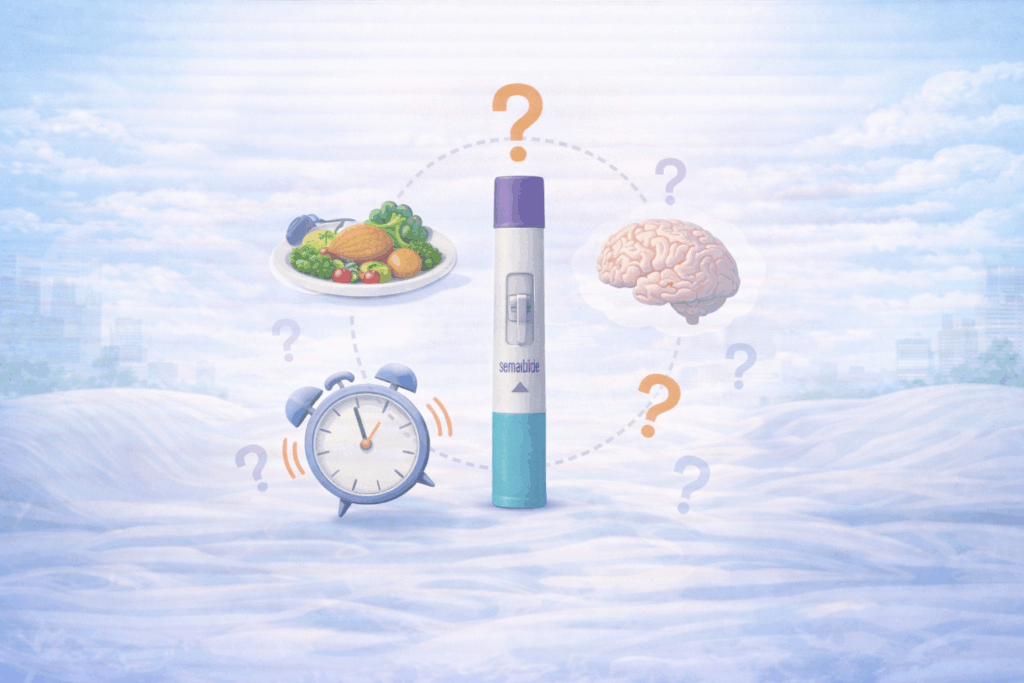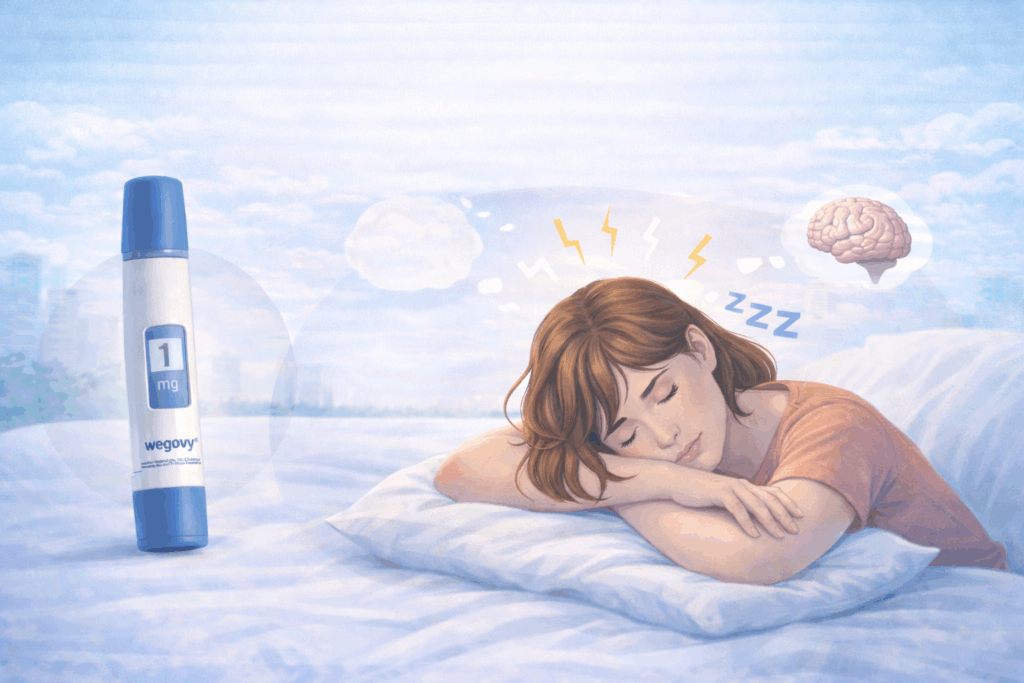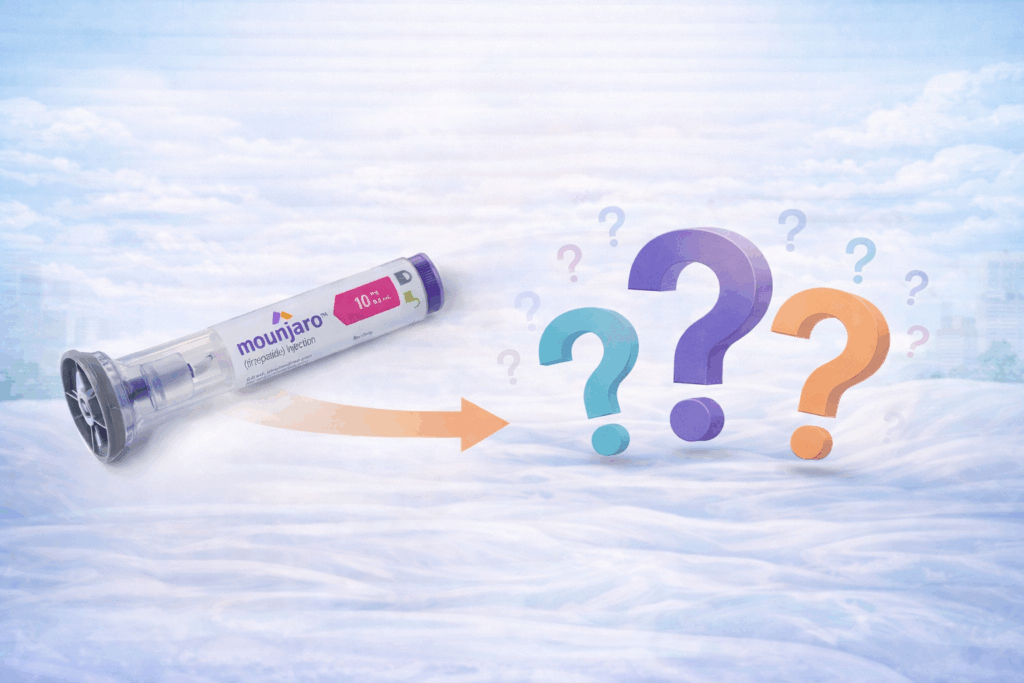Quick Answer: Yes, you can drink alcohol while taking Ozempic, but it’s important to do so in moderation and with care. Alcohol can affect your blood sugar, digestion, and weight loss results, so knowing how to manage it safely is key.
What exactly is Ozempic, and how does it work?
Ozempic (semaglutide) is a prescription medication designed to help regulate blood sugar levels and support weight loss. It belongs to a class of drugs called GLP-1 receptor agonists, which mimic a hormone your body naturally produces after eating. This hormone helps control appetite, slows digestion and improves how your body uses/processes insulin.
For many people, Ozempic has become a game-changer in their physical state – not only for managing type 2 diabetes but also for helping with weight loss and improving overall metabolic health. It works by signalling to your brain that you’re full, reducing hunger and helping you stay satisfied for longer periods. At the same time, it helps your pancreas release insulin more efficiently while also slowing down how fast food leaves your stomach. All of these effects result in diet management being easier to handle.
Because Ozempic affects how your body handles food and sugar, it’s important to consider how alcohol fits into that picture. Drinking changes blood sugar levels and affects your metabolism in ways that can complicate your results.
How alcohol affects blood sugar and metabolism
Alcohol has a direct impact on your blood sugar and, as a result, how your body processes energy. While a glass of wine or a cocktail might feel harmless, alcohol can cause your blood sugar to fluctuate in unpredictable ways – especially when you’re taking medication that also influences insulin and digestion.
When you drink, your liver shifts its focus from managing blood sugar to metabolising alcohol. This means it temporarily stops releasing glucose into your bloodstream. The result? Your blood sugar levels can drop, sometimes sharply, leading to symptoms such as dizziness, sweating, shakiness, and confusion. To make things even more complicated, sugary drinks like cocktails or cider can spike your blood sugar quickly, only for it to later crash.
Over time, regular drinking can also slow your metabolism. Alcohol contains empty calories that your body prioritises burning before fat or carbohydrates, which can interfere with your weight loss goals. When you combine that with Ozempic’s effects on appetite and digestion, you can see why moderation and timing matter.
What are the risks of mixing alcohol with Ozempic?
Drinking while on Ozempic (or any other weight loss medication) isn’t necessarily “dangerous” for everyone, but it does come with its risks. These vary depending on your overall health, how much you drink, and how your body responds to the medication.
Fluctuating blood sugar levels
Both Ozempic and alcohol affect blood sugar control. While Ozempic helps lower blood sugar by improving insulin sensitivity, alcohol can push it in either direction – too high or too low. Hypoglycaemia (low blood sugar) can occur, especially if you drink without eating. It’s often mistaken for being drunk because the symptoms, such as confusion, dizziness and blurred vision, might overlap.
This risk is significant to monitor for people managing diabetes (which is the only reason you should be prescribed Ozempic). Keeping snacks on hand and checking blood sugar regularly when drinking can help prevent unexpected drops.
Stomach & digestive issues
Ozempic slows down digestion, which is why many people feel full faster. Alcohol, however, can irritate the stomach lining and trigger nausea or acid reflux. Combining the two can make these symptoms worse. Some people report feeling bloated or uncomfortable after even small amounts of alcohol while using Ozempic.
Side effects such as nausea, vomiting, or diarrhoea can also make it challenging to stay hydrated and may affect how your body absorbs nutrients.
Slowed weight loss
Alcohol is calorie-dense and nutrient-poor, meaning it adds energy without contributing to your health goals. Each gram of alcohol has seven calories, which can quickly add up, especially if binge drinking. Even moderate drinking can slow progress by increasing appetite or reducing motivation for healthy habits.
If you’re taking Ozempic for weight loss, regular alcohol consumption might make it harder to see consistent results. The extra calories, combined with disrupted metabolism, can offset the medication’s appetite-suppressing benefits.
Dehydration & liver strain
Both Ozempic and alcohol put demands on your liver. While Ozempic and Wegovy are generally safe, combining them with frequent alcohol intake can increase the risk of liver strain, especially if you already have underlying conditions.
Alcohol also acts as a diuretic, pulling water from your body and leading to dehydration. Since Ozempic can sometimes cause nausea or vomiting, dehydration can make those symptoms worse and leave you feeling fatigued or light-headed.
Impaired judgement & safety risks
One of the more overlooked risks of mixing alcohol with any medication is impaired judgment. Because Ozempic can lower your blood sugar, you might misread early signs of hypoglycaemia as intoxication. This combination can make it easier to make unsafe choices – like skipping meals, over drinking or forgetting to take your medication correctly, among countless other poor decisions.
How to minimise the risk of drinking alcohol while using Ozempic
If you choose to drink while taking Ozempic, there are ways to do so safely without undoing your progress. The key is balance, preparation and awareness of how your body responds.
Consult your doctor first
Before introducing alcohol to your routine, it’s wise to speak with your healthcare provider. They can assess your medical history, check for any underlying conditions and help you understand your personal tolerance. This is especially important if you have diabetes, liver issues or take other medications that affect blood sugar.
Your doctor might also suggest timing your drinks around meals or adjusting your dose if you experience frequent low blood sugar.
Drink in moderation
Moderation is the foundation of safe drinking while using Ozempic. The NHS recommends no more than 14 units of alcohol per week, spread over several days. That’s roughly equivalent to six medium glasses of wine or six pints of beer.
Set personal limits and pace yourself. Alternate alcoholic drinks with water or sugar-free mixers, and avoid binge drinking, which can quickly destabilise your blood sugar and digestive system.
Monitor blood sugar levels
When using Ozempic for diabetes management, regular blood sugar monitoring is essential. Alcohol can make your glucose levels unpredictable, so check them before, during and after drinking. Continuous glucose monitors (CGMs) can help you spot trends and act early if your levels drop.
For those without diabetes (who should be using an alternative like Wegovy, another semaglutide drug), paying attention to how you feel – tiredness, sweating, or shakiness – can still help you recognise when alcohol is affecting your balance or energy.
Recognise signs of high and low blood sugar
Knowing what to look for can help you act quickly if things feel off. Low blood sugar may cause sweating, trembling, dizziness or confusion. High blood sugar can lead to thirst, frequent urination and fatigue.
If you experience these symptoms after drinking (more than usual), have a snack or glucose tablet and rest until you feel stable again. Never ignore these warning signs, as they can escalate if untreated.
Never drink on an empty stomach
Drinking without food increases your risk of hypoglycaemia. Always eat before or while drinking. Choose meals that include protein, fibre and healthy fats, such as chicken with vegetables or wholegrain pasta. These foods slow down digestion and help stabilise blood sugar.
Avoid sugary cocktails or high-carb snacks, which can cause quick spikes followed by crashes in your glucose levels.
When to skip alcohol on Ozempic?
There are going to be plenty of times in your treatment plan during which avoiding alcohol entirely will be the best decision. If you’re still in the early stages of taking Ozempic, your body will still be adjusting to the medication. During this phase, side effects such as nausea, dizziness, and fatigue are more common. Alcohol is likely to make them worse.
You should also skip alcohol if you’re experiencing vomiting, dehydration or digestive upset. These symptoms can intensify with alcohol and may slow recovery. Additionally, if you’re using Ozempic alongside other medications that affect blood sugar or the liver, combining them with alcohol can raise the risk of complications. Always check with your doctor before drinking in these cases.
How The Virtual Slimming Clinic supports you
At The Virtual Slimming Clinic, we understand that balance is key. Weight loss isn’t about perfection – it’s about making informed choices that fit into your lifestyle sustainably. Our clinicians will offer personalised support to help you navigate challenges like managing alcohol while using weight loss drugs, whether Ozempic, Wegovy or Mounjaro.
Whether you’re learning how to track your progress, adjust your diet or understand your medication better, we’re here to guide you. We take a holistic approach to prescriptions and education that looks at your health, mindset and habits to create lasting change. That includes realistic advice about social occasions, drinking habits and maintaining progress without restriction or guilt.
If you’re unsure how to balance your social life with your weight loss journey, then reach out; our team can help you set achievable goals that don’t compromise your health.
Conclusion
Drinking alcohol while taking Ozempic is possible – but it requires awareness and moderation. Alcohol affects blood sugar, hydration and weight loss, all of which play a role in how Ozempic works. By understanding the risks, listening to your body, and following safe drinking habits, you can enjoy social occasions without derailing your progress.
Frequently Asked Questions
Will Ozempic still work if I drink alcohol?
Yes, Ozempic will still work if you drink alcohol occasionally. However, frequent or heavy drinking can slow your weight loss progress and make side effects like nausea or fatigue worse. Keeping alcohol intake moderate helps maintain the medication’s effectiveness.
How much alcohol is considered safe on Ozempic?
Most healthcare professionals suggest following general guidelines set by the NHS – no more than 14 units per week, spread over several days. Avoid binge drinking, and always combine alcohol with food to reduce the risk of low blood sugar.
Can I drink alcohol if I have diabetes while taking Ozempic?
Yes, but with caution. Alcohol can cause unpredictable blood sugar fluctuations, so you’ll need to monitor your levels closely. Always carry glucose tablets or snacks, and avoid drinking on an empty stomach.
How does alcohol affect my weight loss progress on Ozempic?
Alcohol adds empty calories and slows metabolism, which can reduce the effectiveness of Ozempic for weight loss. It can also increase cravings and lead to overeating. Limiting alcohol to special occasions helps keep your results on track.
Is it safe to drink socially on weekends while on Ozempic?
For most people, occasional social drinking is fine, as long as it’s done in moderation and with food. Pay attention to how your body responds, stay hydrated and avoid overindulging to keep your progress consistent. Your weekly work drinks might become bi-weekly, but your body will thank you.














